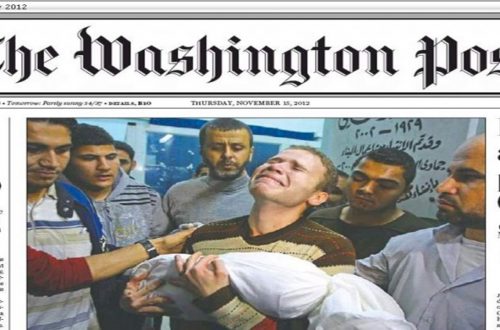Alex’s striking recent post resonated with some thoughts I’ve been having about the Palestinians. Recently I blogged about a panel discussion featuring Gilad Atzmon. Initially I wanted to draw attention to this because of concerns about antisemitism, but I ended up thinking what a pity it is that the Palestinians attract so many unappealing advocates. Clearly there’s quite a spectrum of possible positions between HP and Atzmon, but even those with far less objectionable views often seem more interested in criticising Israel than in supporting the Palestinians. In her ‘Play for Gaza Caryl Churchill doesn’t offer us a single Palestinian voice. The Palestine Telegraph (which I should note publishes some deeply objectionable articles) does have plenty to say about Palestinians – but almost always within the context of Israel. Palestinians seem trapped, in blogs and other media, between those insisting they are the ultimate martyrs, facing a genocide at the hands of the evil Zionists, and those who argue that they live in the lap of luxury.
Neither of these extreme positions is accurate – and it seems to be the exaggerated and tendentious claims of the Palestinians’ supporters which can drive (some) supporters of Israel to brush real concerns aside.* (And that’s possibly understandable when some campaigners romanticise all Palestinians, however hateful their views, while treating attacks against Israelis with apparent indifference.) Many face discrimination, day to day hardship, and restrictions on their ability to travel or work. Some have suffered displacement, others injury and bereavement in war, and most feel that they have been denied the right to self-determination.
In Egypt there are approximately 50,000 Palestinians. Their situation has been far from easy:
Sadat revoked some privileges Palestinians enjoyed under Nasser and in 1978, he enacted a law which banned Palestinian children from free public schools, forcing them to switch to costly private schools. He also imposed Law 48, which prohibited Palestinian workers from the public sector.
They do not have residency rights and cannot register as refugees.
Palestinians in Gaza live under a Hamas regime which increasingly curtails their freedom. The blockade also affects their quality of life. Whether you think the Israeli government or Hamas (or both) is to blame, the people of Gaza have little power to influence either.
In Israel, Arab-Israelis, or Palestinians, have a better quality of life, and more rights, than many majority populations (certainly than most Jews and Christians) in other countries in the region. Some have achieved professional success. Yet discrimination has been identified in several areas – such as building permits, education and employment. Palestinians living in East Jerusalem may lose their residency rights if they leave the country for too long.
Nearly two million Palestinians live in Jordan. Although many of these have Jordanian citizenship, about 40,000 have had their citizenship revoked, apparently to maintain pressure on Israel and help protect Jordan’s (delicate) demographics.
The Jordanian measure rendered the Palestinians “stateless,” depriving them of passports, voting rights, education, travel, health care and jobs.
In Jordan, although there is a Palestinian Queen, Palestinians are under-represented in government, higher education and the military. Yet on balance Palestinians living in Jordan have not fared too badly.
Palestinians in Lebanon lead far more restricted lives. Lebanese labour laws are complex, but the upshot is that, despite ostensible recent improvement in the situation for Palestinian workers, there are severe constraints on their employment opportunities:
A 2006 study by FAFO, a Norwegian non-governmental organization, found that only 11 percent of Palestinian workers had written contracts, and the average hourly wage was 2,600 LL ($1.73). It found that 44 percent of Palestinians working in Lebanon made less than $2,400 a year, compared to six percent of Lebanese.
Conditions in Lebanon’s refugee camps are squalid, and access to health care and education limited.
There are about 700,000 Palestinians in Syria. Although they cannot vote, they are more integrated into society than their counterparts in Lebanon. Yet poverty and poor health are common, and the Palestinians have been targeted in Syria’s recent crackdown against anti-government demonstrators. It’s not only in Israel that the unfortunate and stateless Palestinians are vulnerable to being perceived as a kind of third column.
The situation of Palestinians in the West Bank is far more familiar to most in the West. Humiliating, or simply inconvenient, waits at checkpoints, tense confrontations with settlers, and a separation barrier which makes life and work more complicated for many. There are reasons for these problems, more understandable reasons (it could be argued) in many cases than there are for the problems facing Palestinians in other countries. But they still have a severe impact on the lives of many who have done nothing wrong. Yet Palestinians in the West Bank have good access to education, and, despite the constraints, are able to enjoy amenities such as theatres and lively restaurants.
And of course many Palestinians live outside the region in North America, Europe and elsewhere. Diaspora Palestinians include Ray Hanania who demonstrates here his awareness that the conflict between Israel and Palestine isn’t a black and white issue.
Clearly, feelings of friendship and solidarity for the Palestinians shouldn’t have to be all about blaming Israel. Some commenters have been suggesting that we need an alternative to Amnesty International – perhaps we also need an organisation which supports the cause of Palestinians without (disproportionately) attacking Israel. It ought to be possible for Zionists and anti-anti-zionists to be Palestinianists too.
*Maybe it works the other way too.


